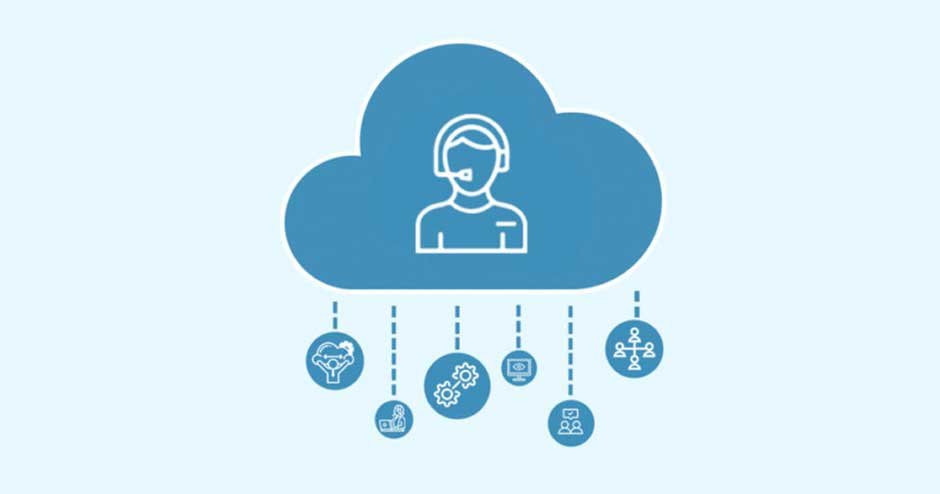Cloud-based solutions keep conquering the business world as they are considered the present and the future of business tools infrastructure location model. Why do on-premise solutions lose their past popularity and attention and why does cloud-based call center software become so popular?
So, let’s define the facts and learn whether cloud-based call center software is the best option to pick up on the market today or is just another marketing term that has nothing to do with real conditions.
What is cloud-based call center software?
Cloud-based call center software is the way of building call center infrastructure, where all operations and data are located and transferred via the cloud environment. This means that the company that uses this software doesn’t have to purchase any infrastructure elements, like servers, phone landlines, and so on, and can run it as a simple desktop application.
Its main rival for years has been the on-premise call center software or inbox call center solution. It is the classic way of building and setting up all the infrastructure on your own – in your location, with your servers and other hardware, and with classic phone landlines. Surely, this also includes purchasing the software itself, so the final bill for setup and maintenance can be very unpleasant to pay, especially for small firms and medium-sized businesses. Nonetheless, the long-term use of on-premises software is a bit cheaper than you pay for cloud call center software on average, and this means that the average annual price is almost similar for both solutions, but the fact that setup of on-premise call center software is too expensive to be affordable pushes it out of the competition.
Why is cloud-based call center software called the future of the call center industry?
As you could guess, a cheaper setup isn’t the end of the cloud call center software benefits list. Cloud call center software provides fantastic call quality and speed of call center operations, so other solutions, like on-premises call center software tools or PBX systems don’t have a chance in this rivalry.
Let’s define the main features of cloud call center software.
Flexible intelligent call routing
Call routing is an important feature to manage customer satisfaction and make sure that all clients will get service in time. This feature allows the call center to route calls to the most proper agents automatically, which means that the system immediately chooses the proper agent for each incoming call based on some criteria. In most cases, the most popular call routing modes are either call routing based on agent performance – most idling agent mode where calls will be routed to the agents who are idling the longest – or skills-based call routing, where each agent has its own score of all “skills” (like languages knowledge, specific technical skills, etc.), and priority calls will be routed to the most skilled agents.
Self-service options
Modern customer service is impossible without providing self-service options. Thus, cloud-based call center software has numerous features that are focused on providing self-service opportunities. First of all, cloud-based call center software includes a modern IVR (Interactive Voice Response) system that can provide customer service 24/7 and gather customer data for further analysis and call routing. Also, you can integrate third-party (or your own) chatbots, knowledge bases – both internal and external, FAQs, and many more.
Multichannel communication
One of the most important parts of customer service is providing customers with an option to choose where they prefer to communicate with a brand. First of all, phone communication via phone calls isn’t the most comfortable communication type, especially if we take into account that people rarely have time to sit down and have a pleasant conversation. Driving, work, lunch – all these activities are activities which you have to delay because of a phone call, and that’s annoying. Nonetheless, our era is the era of messaging, so your clients would also appreciate an option to communicate with you via chats and messengers, as they do with their friends and relatives.
Cloud-based call center software provides numerous communication channels to choose from, including social media (Facebook, Instagram, etc.), messengers like Telegram and WhatsApp, web chats (or live chats, those that are on your website), chatbots, emails, and so on. All these communication channels are united in a single interface, which means you can communicate with different people through different contact channels by using one interface and not spending any time switching between different tools.
Call monitoring and recording
To make sure that agents are providing quality service and face no problems during servicing customers, you can use the call monitoring feature. This feature allows you to listen to real-time calls between agents and clients in a few different modes: the first one is called hidden mode and it is the mode where nobody will spot you listening to a call. The second mode is whispering call monitoring mode, where only agents will hear your advice, and this mode can be useful to help reps deal with difficult situations and angry customers without escalating a call. The third mode is called barging-in mode, and in this mode you can become a third party in the conversation, to avoid developing conflict even further or to resolve difficult situations the agent can’t deal with on his own.
The call recording feature records all calls and stores them in the cloud, so you can listen to call recordings to learn the skills of your agents and their improvement arrears, or just to improve your training sessions and programs.
Conclusion
As you can see, cloud-based call center software is the most advanced call center software available in the market, and it provides the best features for enhancing customer satisfaction and overall customer experience. Based on that, we advise you to take a closer look here to learn all about cloud call center software: https://www.apzomedia.com/how-does-a-cloud-call-center-work/

